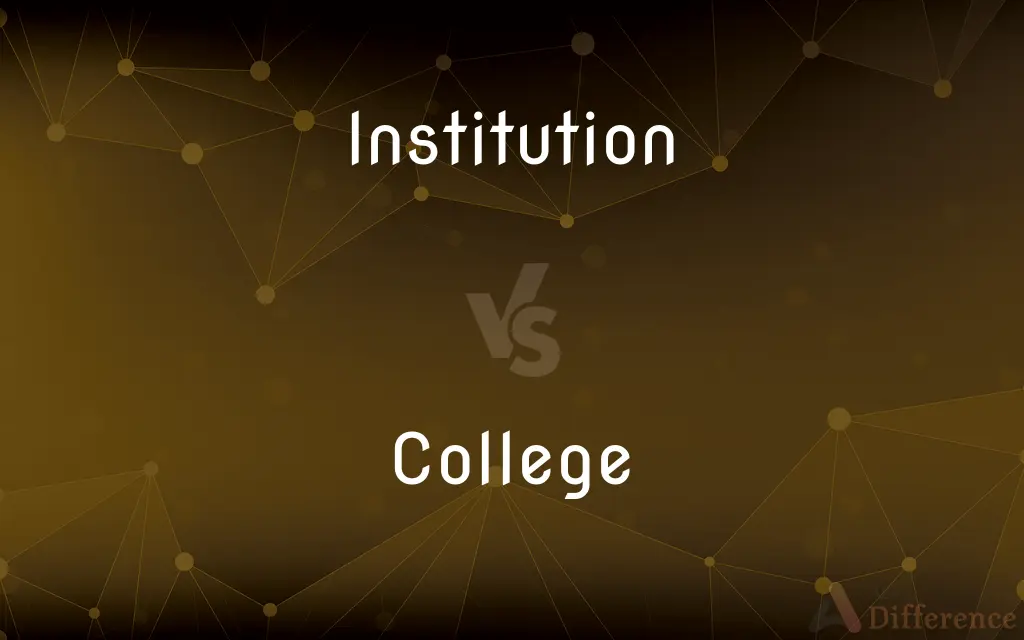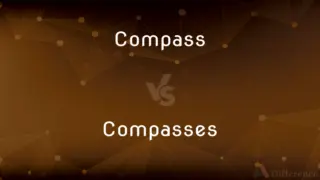Institution vs. College — What's the Difference?
By Tayyaba Rehman & Fiza Rafique — Updated on March 24, 2024
An institution is a broad term for any organization dedicated to education or public service, while a college specifically refers to an educational establishment offering higher education or specialized professional training.

Difference Between Institution and College
Table of Contents
ADVERTISEMENT
Key Differences
An institution encompasses a wide range of organizations, including educational facilities, corporations, and government agencies, focused on a particular purpose or social cause. Colleges, on the other hand, are a subset of institutions dedicated solely to providing higher education and specialized training in various fields.
Institutions are characterized by their broad objectives that can include research, education, healthcare, or charitable activities, providing a wide scope of services to the community. Colleges, whereas, focus specifically on academic and professional development, offering degrees and certifications to their students.
While institutions can exist in various sectors including healthcare, finance, and public service, colleges are primarily found in the educational sector, emphasizing the development of skills and knowledge in specific academic disciplines.
Institutions often have a larger structural and functional complexity, encompassing various departments and units with different objectives. Colleges, on the other hand, usually maintain a more focused structure, dedicated to educational processes and outcomes.
The governance and operational dynamics of institutions can vary widely, depending on their purpose and scope, including private and public ownership. Conversely, colleges are typically governed by academic boards or trustees, with a primary focus on educational excellence and student success.
ADVERTISEMENT
Comparison Chart
Definition
A broad term for organizations dedicated to education, public service, or other specific purposes.
An educational establishment offering higher education and specialized training.
Scope
Can include educational, healthcare, financial, and charitable organizations.
Primarily focused on higher education and specialized professional training.
Objectives
Broad, ranging from education to public service and research.
Focused on academic and professional development.
Structure
Can be complex, encompassing various departments with different objectives.
Usually maintains a focused educational structure.
Governance
Varies widely, can be private or public.
Typically governed by academic boards or trustees focusing on education.
Compare with Definitions
Institution
A rule or principle established in a field.
Due process is a fundamental institution in legal systems.
College
An educational institution offering degree programs beyond high school.
She attended a college known for its engineering program.
Institution
A facility or organization created for a specific purpose.
The Smithsonian is an institution dedicated to public education and research.
College
A group of professionals with shared goals.
The American College of Surgeons sets standards in surgical care.
Institution
A longstanding tradition or system.
Marriage is considered an institution in many societies.
College
An establishment offering specialized courses.
The culinary college is renowned for its hospitality courses.
Institution
A large organization providing a particular service.
The institution serves thousands of urban poor annually.
College
An institution for higher learning with a focus on vocational training.
The technical college offers certifications in various trades.
Institution
A place of confinement for the care of people with special needs.
The mental health institution has been operational for over a century.
College
A constituent part of a university.
The College of Arts and Sciences offers a wide range of courses.
Institution
Institutions, according to Samuel P. Huntington, are "stable, valued, recurring patterns of behavior". Institutions can refer to mechanisms which govern the behavior of a set of individuals within a given community, and are identified with a social purpose, transcending individuals and intentions by mediating the rules that govern living behavior.
College
A college (Latin: collegium) is an educational institution or a constituent part of one. A college may be a degree-awarding tertiary educational institution, a part of a collegiate or federal university, an institution offering vocational education, or a secondary school.
Institution
The act of instituting
The institution of reforms.
College
An institution of higher learning that grants the bachelor's degree in liberal arts or science or both.
Institution
A custom, practice, relationship, or behavioral pattern of importance in the life of a community or society
The institutions of marriage and the family.
College
An undergraduate division or school of a university offering courses and granting degrees in a particular field or group of fields.
Institution
(Informal) One long associated with a specified place, position, or function.
College
A junior or community college.
Institution
An established organization or foundation, especially one dedicated to education, public service, or culture.
College
A school offering special instruction in a professional or technical subject
A medical college.
Institution
A building or complex of buildings housing such an organization.
College
The students, faculty, and administration of one of these schools or institutions
New policies adopted by the college.
Institution
A building or complex of buildings housing people who need special services, such as orphans or people with mental disabilities.
College
The building, buildings, or grounds where one of these schools or institutions is located
Drove over to the college.
Institution
A custom or practice of a society or community.
The institution of marriage is present in many cultures but its details vary widely across them.
College
Chiefly British A self-governing society of scholars for study or instruction, incorporated within a university.
Institution
A long established and respected organization, particularly one involved with education, public service, or charity work.
The University of the South Pacific is the only internationally accredited institution of higher education in Oceania.
College
An institution for secondary education in France and certain other countries that is not supported by the state.
Institution
The building or buildings which house such an organization.
He's been in an institution since the crash.
College
A body of persons having a common purpose or shared duties
A college of surgeons.
Institution
A mental institution.
College
An electoral college.
Institution
(informal) Any long established and respected place or business.
Over time, the local pub has become something of an institution.
College
A body of clerics living together on an endowment.
Institution
(informal) A person long established in a place, position, or field.
She's not just any old scholar; she is an institution.
College
(obsolete) A corporate group; a group of colleagues.
Institution
The act of instituting something.
The institution of higher speed limits was a popular move but increased the severity of crashes.
College
(in some proper nouns) A group sharing common purposes or goals.
College of Cardinals, College of Surgeons
Institution
(Christianity) The act by which a bishop commits a cure of souls to a priest. en
College
(politics) An electoral college.
Institution
(obsolete) That which institutes or instructs, particularly a textbook or system of elements or rules.
College
An academic institution.
Institution
The act or process of instituting; as: (a) Establishment; foundation; enactment; as, the institution of a school.
The institution of God's law is described as being established by solemn injunction.
College
A specialized division of a university.
College of Engineering
Institution
Instruction; education.
College
An institution of higher education teaching undergraduates.
She's still in college
These should be his college years, but he joined the Army.
Institution
That which instituted or established
The nature of our people,Our city's institutions.
College
A university.
Institution
An established or organized society or corporation; an establishment, especially of a public character, or affecting a community; a foundation; as, a literary institution; a charitable institution; also, a building or the buildings occupied or used by such organization; as, the Smithsonian Institution.
We ordered a lunch (the most delightful of English institutions, next to dinner) to be ready against our return.
College
(Canada) A postsecondary institution that offers vocational training and/or associate's degrees.
Institution
That which institutes or instructs; a textbook; a system of elements or rules; an institute.
There is another manuscript, of above three hundred years old, . . . being an institution of physic.
College
A non-specialized, semi-autonomous division of a university, with its own faculty, departments, library, etc.
Pembroke College, Cambridge
Balliol College, Oxford
University College, London
Institution
An organization founded and united for a specific purpose
College
(UK) An institution of further education at an intermediate level; sixth form.
Institution
An establishment consisting of a building or complex of buildings where an organization for the promotion of some cause is situated
College
(UK) An institution for adult education at a basic or intermediate level (teaching those of any age).
Institution
A custom that for a long time has been an important feature of some group or society;
The institution of marriage
The institution of slavery
He had become an institution in the theater
College
A high school or secondary school.
Eton College
Institution
The act of starting something for the first time; introducing something new;
She looked forward to her initiation as an adult
The foundation of a new scientific society
He regards the fork as a modern introduction
College
(Australia) A private (non-government) primary or high school.
Institution
A hospital for mentally incompetent or unbalanced person
College
(Australia) A residential hall associated with a university, possibly having its own tutors.
College
(Singapore) A government high school, short for junior college.
College
(in Chile) A bilingual school.
College
A collection, body, or society of persons engaged in common pursuits, or having common duties and interests, and sometimes, by charter, peculiar rights and privileges; as, a college of heralds; a college of electors; a college of bishops.
The college of the cardinals.
Then they made colleges of sufferers; persons who, to secure their inheritance in the world to come, did cut off all their portion in this.
College
A society of scholars or friends of learning, incorporated for study or instruction, esp. in the higher branches of knowledge; as, the colleges of Oxford and Cambridge Universities, and many American colleges.
College
A building, or number of buildings, used by a college.
College
Fig.: A community.
Thick as the college of the bees in May.
College
The body of faculty and students of a college
College
An institution of higher education created to educate and grant degrees; often a part of a university
College
British slang for prison
College
A complex of buildings in which a college is housed
Common Curiosities
Can a college be considered an institution?
Yes, a college is a type of educational institution.
What is an institution?
An organization dedicated to a specific purpose, such as education, public service, or research.
What are examples of institutions?
Examples include universities, hospitals, and charities.
Can institutions be both public and private?
Yes, institutions can operate under both public and private ownership.
What is the primary goal of a college?
To provide higher education and specialized training in specific fields.
Why are colleges important?
Colleges are crucial for providing higher education and preparing individuals for professional careers.
Do institutions only exist within the educational sector?
No, institutions can be part of various sectors including healthcare, finance, and public service.
What defines a college?
An educational establishment offering higher education and specialized professional training.
How do colleges differ from universities?
Colleges are often smaller and offer more specialized programs, while universities include a variety of colleges within a larger framework.
Are all institutions focused on education?
Not all; institutions can also focus on healthcare, finance, and other areas.
Can someone receive professional training at a college?
Yes, many colleges offer specialized professional training programs.
Do institutions have a broader impact than colleges?
Yes, due to their varied objectives, institutions can impact many aspects of society.
What makes an institution different from a simple organization?
Institutions often have a more formal structure, a broader impact on society, and a more specific purpose than general organizations.
Is the governance of colleges different from other institutions?
Generally, colleges are governed by academic boards or trustees, focusing specifically on educational goals.
What roles do institutions play in society?
They serve educational, healthcare, charitable, and many other roles, contributing to societal development.
Share Your Discovery

Previous Comparison
Haircut vs. Hairstyle
Next Comparison
Compass vs. CompassesAuthor Spotlight
Written by
Tayyaba RehmanTayyaba Rehman is a distinguished writer, currently serving as a primary contributor to askdifference.com. As a researcher in semantics and etymology, Tayyaba's passion for the complexity of languages and their distinctions has found a perfect home on the platform. Tayyaba delves into the intricacies of language, distinguishing between commonly confused words and phrases, thereby providing clarity for readers worldwide.
Co-written by
Fiza RafiqueFiza Rafique is a skilled content writer at AskDifference.com, where she meticulously refines and enhances written pieces. Drawing from her vast editorial expertise, Fiza ensures clarity, accuracy, and precision in every article. Passionate about language, she continually seeks to elevate the quality of content for readers worldwide.















































